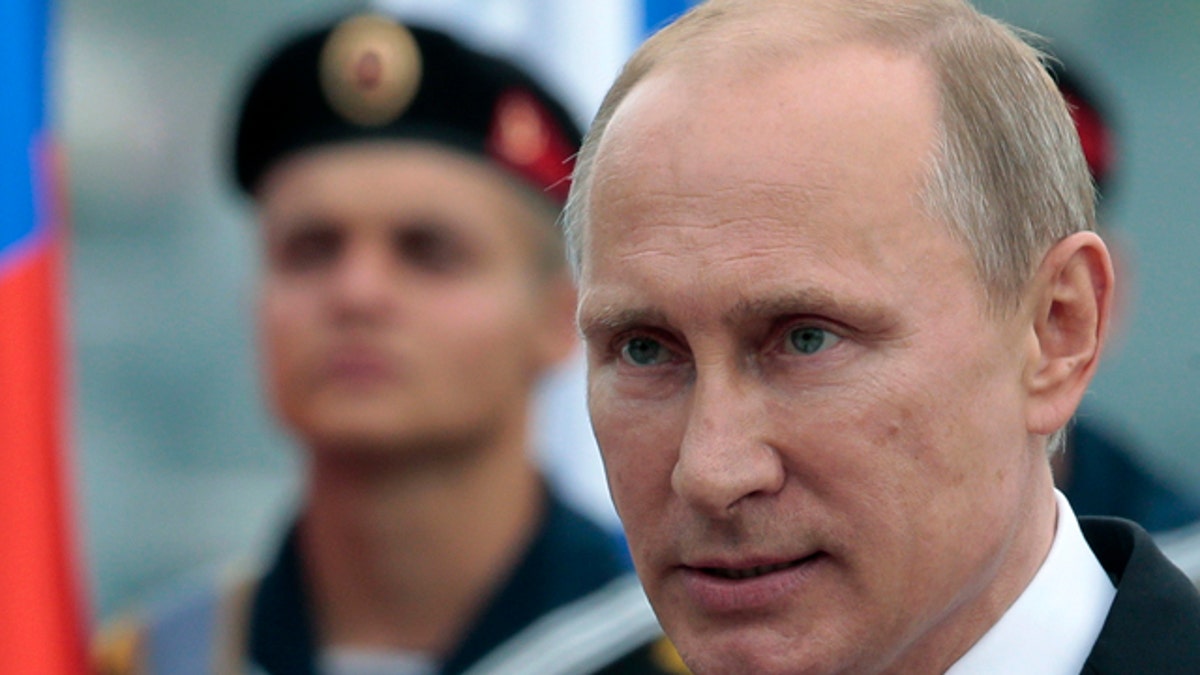
FILE - In this May 9, 2014 file photo, Russian President Vladimir Putin heads to speak at a navy parade marking Victory Day in Sevastopol, Crimea. (AP Photo/Ivan Sekretarev, File)
TOKYO – Angry with the West's response over Ukraine and eager to diversify its options, Russia is moving rapidly to bolster ties with North Korea in a diplomatic nose-thumbing that could complicate the U.S.-led effort to squeeze Pyongyang into giving up its nuclear weapons program.
Russia's proactive strategy in Asia, which also involves cozying up to China and has been dubbed "Putin's Pivot," began years ago as Moscow's answer to Washington's much-touted alliance-building and rebalancing of its military forces in the Pacific. But it has gained a new sense of urgency since Ukraine -- and Pyongyang is already getting a big windfall.
Moscow's overtures to North Korea reflect both a defensive distancing from the EU and Washington because of their sanctions over Ukraine and a broader, long-term effort by Russia to strengthen its hand in Asia by building political alliances, expanding energy exports and developing Russian regions in Siberia and the Far East.
For North Korea, the timing couldn't be better.
Since the demise of the Soviet Union and the largesse it banked on as a member of the communist bloc, the North has been struggling to keep its economy afloat and has depended heavily on trade and assistance from ally China. Sanctions over its nuclear and missile programs have further isolated the country, and Pyongyang has long feared it could become too beholden to Beijing.
Better ties with Russia could provide a much needed economic boost, a counterbalance against Chinese influence and a potentially useful wedge against the West in international forums -- and particularly in the U.S.-led effort to isolate Pyongyang over its development of nuclear weapons.
"By strengthening its relationship with North Korea, Russia is trying to enhance its bargaining position vis-α-vis the United States and Japan," said Narushige Michishita, a North Korea and Asia security expert at Japan's National Graduate Institute for Policy Studies. Michishita added that showing Washington he will not be cowed by the sanctions was "one of the most important factors" why Putin is wooing Pyongyang now.
Moscow remains wary of having a nuclear-armed North Korea on its border. But over the past few months it has courted the North with promises of increased trade and development projects, high-level political exchanges and a vote in the Duma, the top Russian legislative body, to write off nearly $10 billion in debt held over from the Soviet era.
It has pledged to reinvest $1 billion that Pyongyang still owes into a trans-Siberian railway through North Korea to South Korea -- a project that is still in the very early stages. That, together with a pipeline, would allow Russia to export gas and electricity to South Korea, a potentially lucrative deal for all three.
Michishita noted that the same day the United Nation's General Assembly passed a resolution condemning Russia's annexation of Crimea, Russia and North Korea were busy signing an economic trade cooperation pact.
The warming began around July last year, but it has accelerated as Moscow's antagonism with the West has grown.
Moscow sent a relatively low-ranking representative to the 60th anniversary of the end of fighting in the Korean War that month. But since then, it has hosted North Korea's head of state at the opening of the Olympic Games in Sochi and, in March, sent its minister in charge of Far East development to Pyongyang.
A three-day visit in April by Deputy Prime Minister Yuri Trutnev, who is also the presidential envoy for Russia's far eastern federal district, marked the "culmination of a new phase in Russian-North Korean relations taking shape -- a sort of renaissance if you will," Alexander Vorontsov, a North Korea expert at the Russia Academy of Sciences, wrote recently on the influential 38 North blog.
"It is still an open question whether the current crisis in Ukraine will result in any more substantial shifts in Russian policy toward North Korea, particularly in dealing with the nuclear and missile issues," Vorontsov said in his blog post. "With the West increasing pressure on Russia as a result of differences over Ukraine, the very fact that Moscow and Pyongyang are subject to US sanctions will objectively draw them together, as well as with China."
Since 2003, a series of multilateral talks have been one of the primary means of pressuring North Korea to denuclearize and to coordinate policy between the six main countries involved -- China, Russia, the United States, Japan and North and South Korea.
Though still seen as one of the best tools the international community has to pressure Pyongyang on the nuclear issue, the talks were fraught from the start because of the North's unwillingness to back down and the lack of a unified stance among the five other nations.
With North Korea showing no signs of giving up its nuclear option, some analysts believe a widening rift between Russia and the U.S. could weaken future six-party talks.
"North Korea's motivations and actions are driven by the leadership's perceptions, world view, and ideology," said Seoul-based analyst Daniel Pinkston, of the International Crisis Group. "That remains the same. As long as the leadership is wedded to son'gun (Military First) ideology, they will not denuclearize before the rest of the world does. And that's exactly what their government and media say repeatedly."
Michishita, the Japanese security expert, said the Moscow-Pyongyang thaw could just muddy the waters.
"North Korea will not denuclearize anyway," he said. "A better relationship with Russia might be a positive factor for North Korea in coming back to the six-party talks. But North Korea will certainly try to use it to enhance its position vis-α-vis not only the United States and Japan, but also China."








































